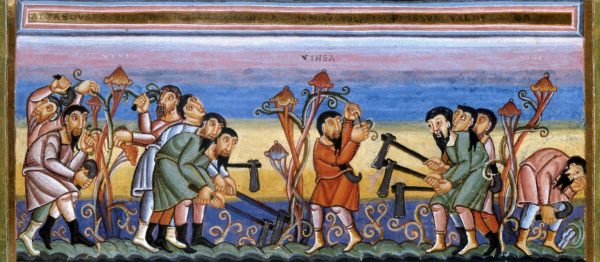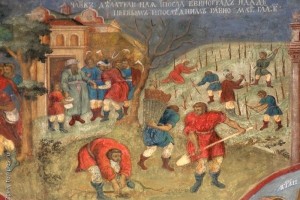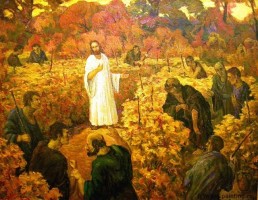Matthew 21:33-42
33 Hear another parable: There was a certain householder, which planted a vineyard, and hedged it round about, and digged a winepress in it, and built a tower, and let it out to husbandmen, and went into a far country:34 And when the time of the fruit drew near, he sent his servants to the husbandmen, that they might receive the fruits of it.35 And the husbandmen took his servants, and beat one, and killed another, and stoned another.36 Again, he sent other servants more than the first: and they did unto them likewise.37 But last of all he sent unto them his son, saying, They will reverence my son.38 But when the husbandmen saw the son, they said among themselves, This is the heir; come, let us kill him, and let us seize on his inheritance.39 And they caught him, and cast him out of the vineyard, and slew him.40 When the lord therefore of the vineyard cometh, what will he do unto those husbandmen?41 They say unto him, He will miserably destroy those wicked men, and will let out his vineyard unto other husbandmen, which shall render him the fruits in their seasons.42 Jesus saith unto them, Did ye never read in the scriptures, The stone which the builders rejected, the same is become the head of the corner: this is the Lord’s doing, and it is marvellous in our eyes?
In the Parable of the Vineyard (Mt 21: 33-42), we hear the story of an owner of a vineyard who handed it over to tenants and departed for a far country. When the time arrived for it to bear fruits, he sent his servants to collect them, but the tenants beat some and killed others. Finally, the owner sent his son, saying, “Surely they will reverence my son.” But this was not the case. They laid hold of him, cast him out, and killed him.
Up to this point the story is quite clear, and its meaning is clear: Christ is describing to the “chief priests and elders of the people” the history of God’s relationship with Israel. The servants are the prophets and he himself is the Son. He would himself, he says, in the end be cast out by the “tenants,” the leaders of the people, and slain. But then Christ changes tack, doing so in order to give his listeners, themselves the leaders of the people, a chance to see that it is they whom the parable describes. He does so by asking them a simple question: “What will the owner of the vineyard do when he finally arrives himself to take possession of the fruits of the vineyard which he has planted?” And they reply: “He will miserably destroy those wicked men, and will let out his vineyard unto other husbandmen, which shall render him the fruits in their seasons.”
By this reply the chief priests and elders show that they have understood nothing. They have not been able to “read” the parable. They have not grasped the nature, the true character of the owner of the vineyard; they have not understood the nature of God. For it is not the nature of the Father to punish and destroy. It is his nature to give. He sends his servants to the tenants, and in spite of the way the tenants treat them, he sends others, and finally his Son. He gives what is his to the tenants, just as he himself planted the vineyard in the first place, and then gave it over to others to work in.
But Jesus’ audience does not see this. They bring into the story an attitude that they find in themselves, not in the narrative they have heard. They introduce into the story anger, and violence, and death. Jesus had not done this; he had left them free, in their reply, to reveal themselves. God, in the parable as told by Christ, is one who gives, who shares what is his. But the chief priests and elders make of him someone who seeks revenge, someone who takes the lives of others, who casts out the other, who destroys rather than builds, who breaks personal bonds rather than seeking to establish them. And because they have shown themselves unable to grasp the nature of God and his relationship with man, they have themselves unprompted and unwittingly identified themselves with the tenants, the very people whom they said the owner of the vineyard would destroy. They are themselves “those wicked men.”
This marvelous story reveals how subtle Christ is in dealing with his opponents: he leaves them free to condemn themselves. In the end it is the chief priests and the elders who have cast themselves out of God’s vineyard; it is they who have shown themselves to be unworthy stewards of God’s gifts, unworthy of participation in God’s Kingdom. God leaves us free, just as Christ leaves the “chief priests and elders” free in Matthew’s version of the Parable of the Vineyard. We condemn or justify ourselves. How often do we condemn ourselves by siding with Christ’s opponents in today’s Gospel, angrily seeking revenge — and even ascribing such thoughts to God — when Christ himself has told us that God, his Father “maketh his sun to shine on the evil and on the good, and sendeth rain on the just and on the unjust.”
This is the God that Christ reveals to us in this parable. The “chief priests and elders of the people” were unable to grasp the revelation of God that is given to us through Christ. We must always ask ourselves: “Do we find this difficult ourselves?”
















